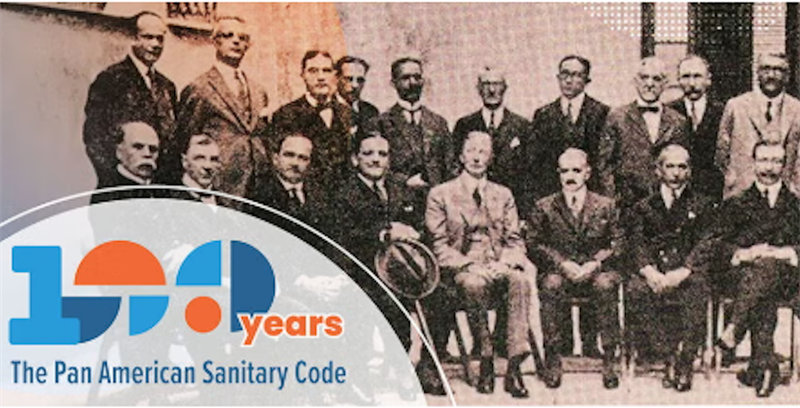THE CODE COMMITTED THE REGION OF THE AMERICAS TO WORK TOGETHER TO PREVENT THE INTERNATIONAL SPREAD OF COMMUNICABLE DISEASES.
 The Pan American Health Organization (PAHO) Director, Dr. Jarbas Barbosa, today convened Ministers of Health and other high-level health authorities for a panel discussion to celebrate the 100th anniversary of the Pan American Sanitary Code.
The Pan American Health Organization (PAHO) Director, Dr. Jarbas Barbosa, today convened Ministers of Health and other high-level health authorities for a panel discussion to celebrate the 100th anniversary of the Pan American Sanitary Code.
The Pan American Sanitary Code, which was adopted by countries of the Americas on the 14th of November 1924 in Cuba, was the first multilateral treaty of its kind. It committed the Region of the Americas to work together to prevent the international spread of communicable diseases and committed countries to provide notification of the appearance of any suspected cases of contagion within their territories.
During the opening of the celebration, Dr. Barbosa noted that “today, a century later, 20 articles of the Pan American Sanitary Code remain in force,” establishing the fundamental duties of PAHO as a regional public health agency. The Code also inspired the creation of other global health cooperation frameworks, including the first International Health Regulations (IHR) that entered into force in 1951.
The recent challenges of the COVID-19 pandemic “have shown us that, a hundred years later, the principles of Pan Americanism and solidarity, established in the Pan American Sanitary Code, remain valid and necessary,” the PAHO Director added.
For Dr. Barbosa, the amendments to the IHR, adopted during the World Health Assembly in May of this year, as well as the new Pandemic Agreement, currently being negotiated by World Health Organization (WHO) Member States are crucial “to better prepare the world for future outbreaks and public health emergencies.”
To support countries in these processes, PAHO has convened in-person meetings with countries of the Americas and Permanent Missions in Geneva, to discuss priority elements of these negotiations, and has also facilitated external evaluations of health capacities in Latin America and the Caribbean under the IHR.
The PAHO Director underscored that “the same spirit of cooperation that inspired the 1924 Code is also reflected in the implementation of the Regional Platform for Innovation and Production of Medicines,” a collaborative Pan-American effort to achieve self-sufficiency, through the regional production of medicines, vaccines and critical health supplies.”
Affirming the Organization’s continued commitment to the solidarity and cooperation that inspired the creation of the Pan American Sanitary Code 100 years ago, Dr. Barbosa called on countries to “recognize that our safety and well-being depend on unified collaboration in public health across the continent.”
“May these 100 years of Pan Americanism inspire us to continue strengthening our collaboration and solidarity, to continue building together a future of better health and well-being for the peoples of the Americas,” he concluded.
Also speaking at the celebration were PAHO Directors Emeritus, Dr. George Alleyne and Dr. Mirta Roses, as well as a Panel, moderated by Dr. Ciro Ugarte, Director of the PAHO Health Emergencies department, with the participation of Dr. Ximena Aguilera, Minister of Health of Chile; Dr. Kayla Laserson, Director of the Global Health Center of the United States Centers for Disease Prevention and Control (CDC); Dr. Vivian Kouri Cardella, Director of the Pedro Kouri Institute, Cuba; Dr Nisia Trinidade, Minister of Health of Brazil; Juan Carlos Salazar, Secretary General of the International Civil Aviation Organization (ICAO); and Dr. Peter Figueroa, Professor of Public Health at the University of the West Indies, Jamaica.